How to Treat Mosquito Bites

A hand scratching at a pruritus on arm. Photograph by Orling
Most people do not know how to treat mosquito bites. They scratch the itch caused by the bite and forget about it. On the other hand, there are those who develop allergic reactions and discomfort from such a small bite. Here are some of the best ways to avoid infection.
Do Not Scratch
The most annoying part about a mosquito bite is the itchiness that it causes. As a reaction, we normally scratch on the area until satisfied. However, scratching can cause breaks in the skin through which infection can enter. Scratching will feel like you are relieving the itch but it can actually worsen the problem.
 Use Antibacterial Soap
Use Antibacterial Soap
Instead of scratching, it is best to wash the bitten skin with antibacterial soap and water instead. Lye in the soap will help relieve itchiness and reduce the chances of infection. After washing, make sure you pat dry gently and resist the temptation to rub the skin with scratchy towel.
 Essential Oils
Essential Oils
Tea tree oil is an anti-inflammatory essential oil that can stop itching, pain, and swelling. It also has anti-viral and anti-bacterial properties that prevent infections. It is one of the most known natural repellents against mosquitoes since it is safe to humans and the environment.
 Vinegar
Vinegar
Its acidity makes it an effective cure for itchy skin. Putting a few drops of vinegar on cotton and applying it on the affected area will help ease the discomfort.
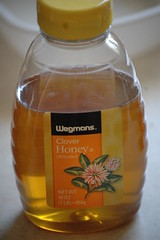
Honey—nanamin2003 (Flickr.com)
Honey
This sweetener is known for its anti-bacterial and anti-inflammatory properties. Because of this, honey is one of the natural balms or lotions that you can use to cure itchiness.
Cooled Tea Bags
As much as they can reduce eye puffiness, cooled tea bags can also act as an astringent that can ease swelling.
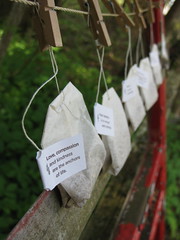
Tea Bags—katerha (Flickr.com)
Basil
It contains compounds namely thymol and camphor that can mitigate itchiness.
Lime and Lemon
These citrus fruits are anti-microbial, anti-itch, and anti-bacterial. The juice that you get out of its peal can kill all kinds of bacteria. However, make sure you do not go out into the sun since you will definitely get a scorching reaction. Use this remedy only when you are planning to stay indoors.

Lime and lemon, Lemons and limes—richard north (Flickr.com)
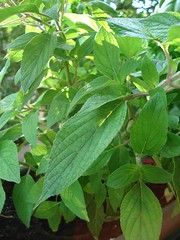
Peppermint Patty—Michael Lehet (Flickr.com)
Peppermint
If you have tried applying toothpaste to ease the itchiness before, you may have an idea as to why the minty-fresh peppermint can do wonders to your itchy discomfort. The coolness of the peppermint overrides the itchiness and gets to the brain faster.
Since the brain can only process one sensation at a time, the cooling sensation of the peppermint blocks that of the itchy bite of an insect.
Milk and Water
If you wish to have a soothing compress, a combination of milk and water can do wonders.

Ice Cubes—Kevin Saff (Flickr.com)

Milk and water, Milk Splash—Fields of View (Flickr.com)
Ice Cubes
Another effective way to relieve the itch is by using ice cubes. Whether you use an ice pack, towel, or t-shirt to hold the cubes, placing the ice on top of the bite will surely ease the discomfort. At the same time, it will also reduce the redness and the swelling. This is very helpful especially for smaller children since the remedy is quick and the relief is almost instant.
Itch-relief Paste or Lotion
If you live in an area where mosquitoes are abundant, it is best to keep an itch-relief paste or lotion at home. There are commercial products that you can purchase in drugstores or grocery. However, there are ingredients available in your kitchen that you can use in case you haven’t yet purchased a paste or lotion. You may also want to check your garden for plants that repel mosquitoes.

Aloe vera x arborescens leaves—tonrulkens (Flickr.com)
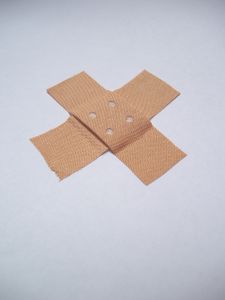
Photograph by: kalilo
Putting a Band Aid
This is mostly recommended for children or adults who cannot help to scratch the bite. Putting a band-aid over the area protects the skin from getting bruised and from the bacteria that may enter the skin afterwards.
If you know how to treat mosquito bites properly, you will not find visible scars. However, there are over-the-counter scar-fading creams that you can use in case you have accidentally scratched a mosquito bite. Keep in mind that mosquito bites are minor irritations and they are definitely not worth giving up the outdoors for.
Filed under: Mosquito Bites Treatment
Like this post? Subscribe to my RSS feed and get loads more!
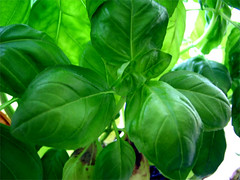
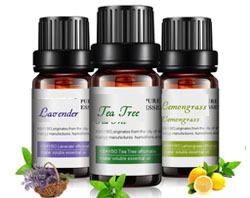
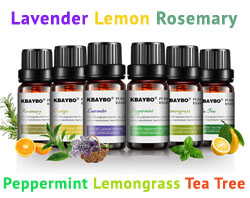
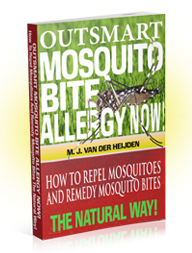
I had not seen your comment about not using topical benadryl and I am wondering if the rash that just popped up on my son”s chest is due to an allergy to the meds?
Do NOT use topical Benadryl. It doesn’t work, and can indeed lead to sensitization and bigger reactions. Give an oral antihisamine like Benadryl, Zyrtec, or Claritin. Consult a pediatrician if the rash persists.